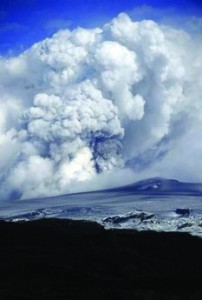On Apr. 14, Iceland’s volcano Eyjafjallajokull erupted, filling the clouds and sky with tons of ash. This volcano caused Europe’s aviation safety authorities to be faced with an unprecedented dilemma and take drastic action to avoid a loss of power disaster caused by engine damage. Europe’s airspace was shut down the next day.

France, Germany, Ireland, Sweden, Norway, Belgium, Denmark, Poland, and the Netherlands also announced the complete or partial closure of their airspace, authorities in each country said. Volcanic ash can cause jet engines to shut down. Matthew Watson, a geophysicist at England’s Bristol University said, “You really need two things to happen: you need the volcano to stop emplacing ash to the altitude that commercial aircraft fly at, 30-35,000 feet, and you then need the upper level winds to blow the ash and disperse it out of the airspace.”
The ash plume drifted between 20,000 feet and 36,000 feet (6,000 meters and 11,000 meters), where it could get sucked into airplane engines. The smoke and ash could also affect aircraft visibility. The disruption caused havoc for air travel around the world. The Air Transport Association of America said member airlines canceled about 165 flights to and from Europe on Thursday due to the volcanic activity. U.S. carriers operate 337 flights to and from Europe each day, according to the association, whose members carry more than 90 percent of U.S. passengers. An emergency evacuation affecting 800 people was conducted near the volcano due to flash flooding from glacier waters, according to Rognvaldur Olafsson of Iceland’s civil protection agency. The cloud, floating miles above Earth, wrecked travel plans for tens of thousands of people, from tourists and business travelers to politicians and royals. Iceland, a nation of 320,000 people, sits on a large volcanic hot spot in the Atlantic’s mid-oceanic ridge, and has history of devastating eruptions.













